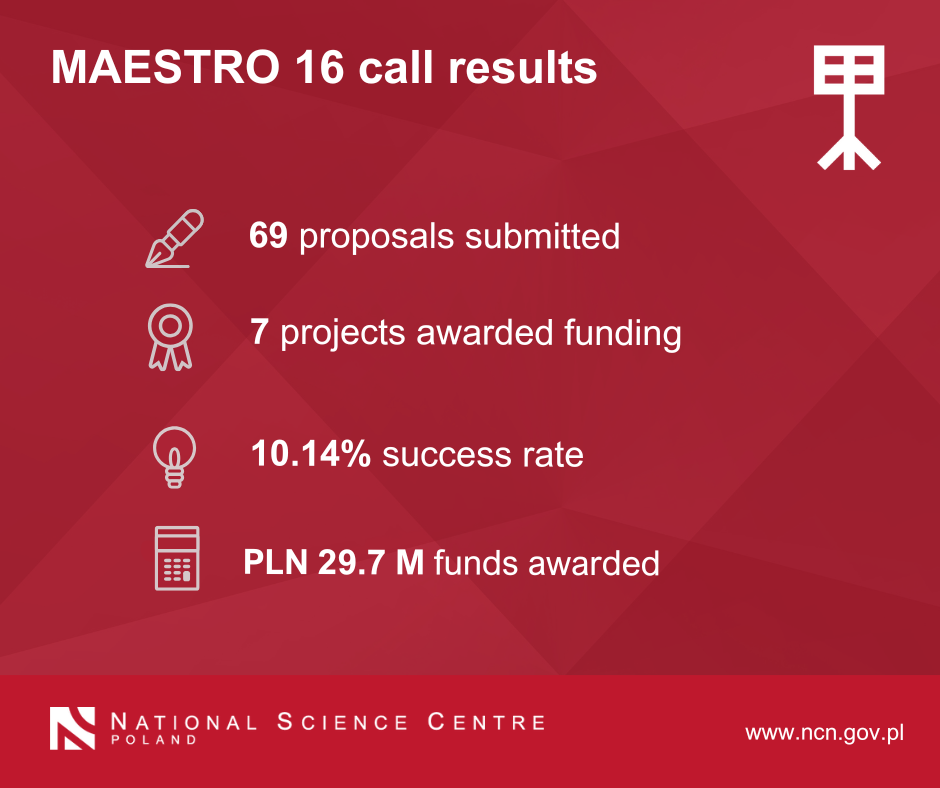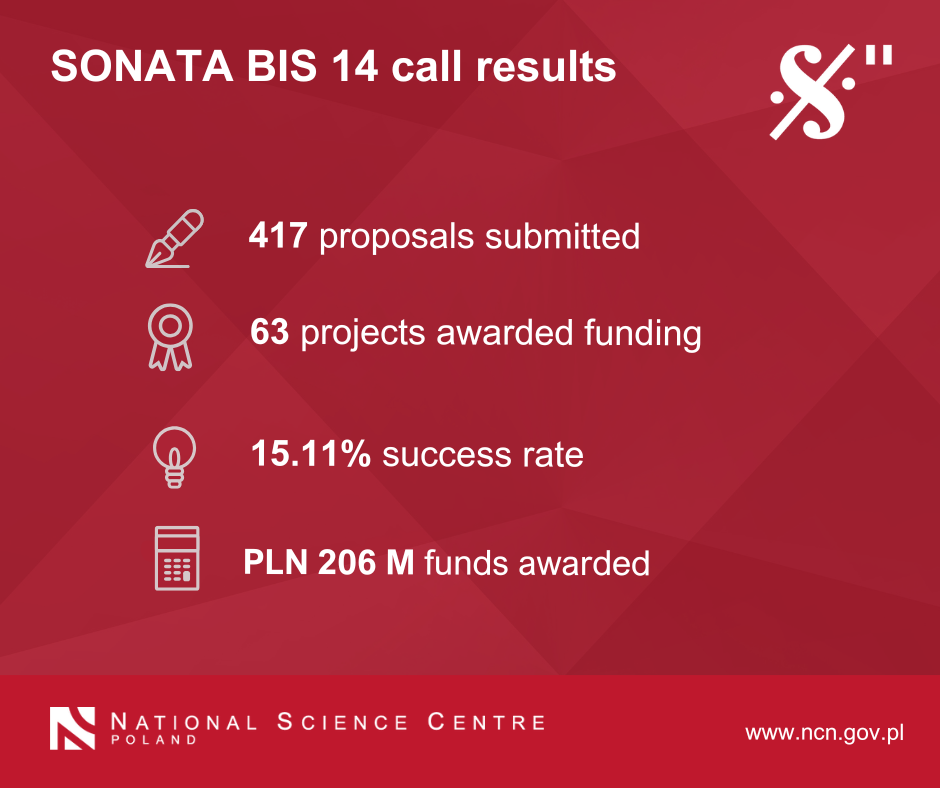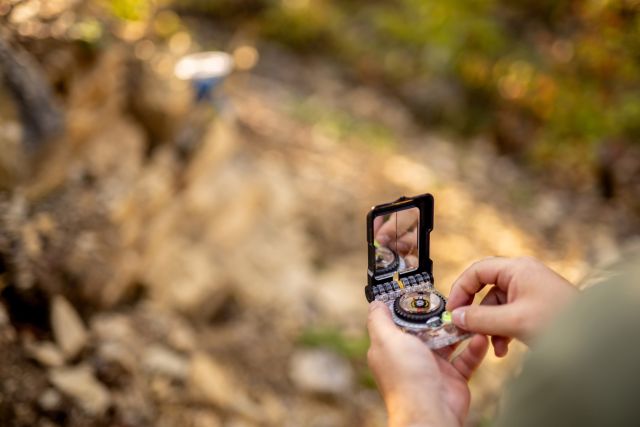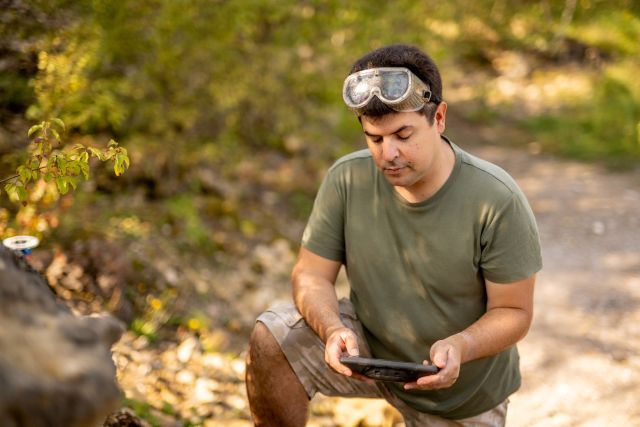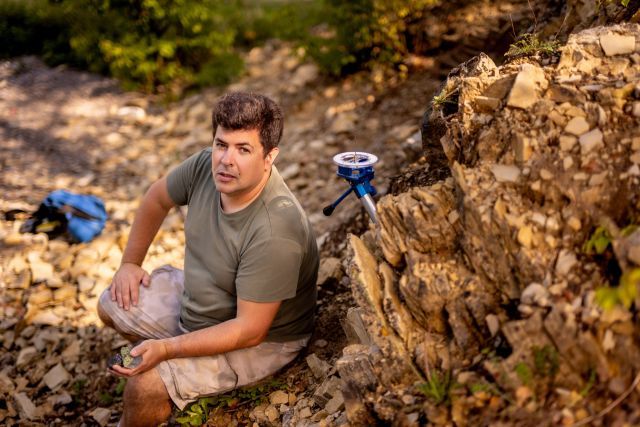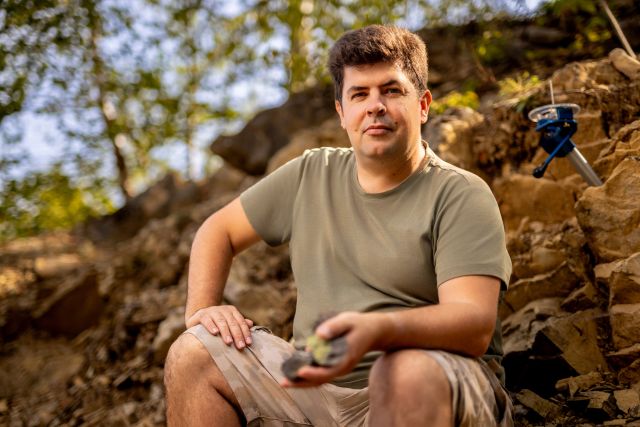“All ambitious scientific work involves risk. Sometimes we spend a year researching a topic, everything seems promising, and then it turns out that nothing comes of it, and we are no wiser than we were at the outset. It doesn’t always work, but the key is to look for new solutions instead of following the well-trodden paths,” says Dr Krzysztof Szade, a biochemist at the Jagiellonian University in conversation with Anna Korzekwa-Józefowicz, talking about the scientific challenges and the realities of working in Poland.
Dr Krzysztof Szade is a biochemist, specialising in haematopoietic stem
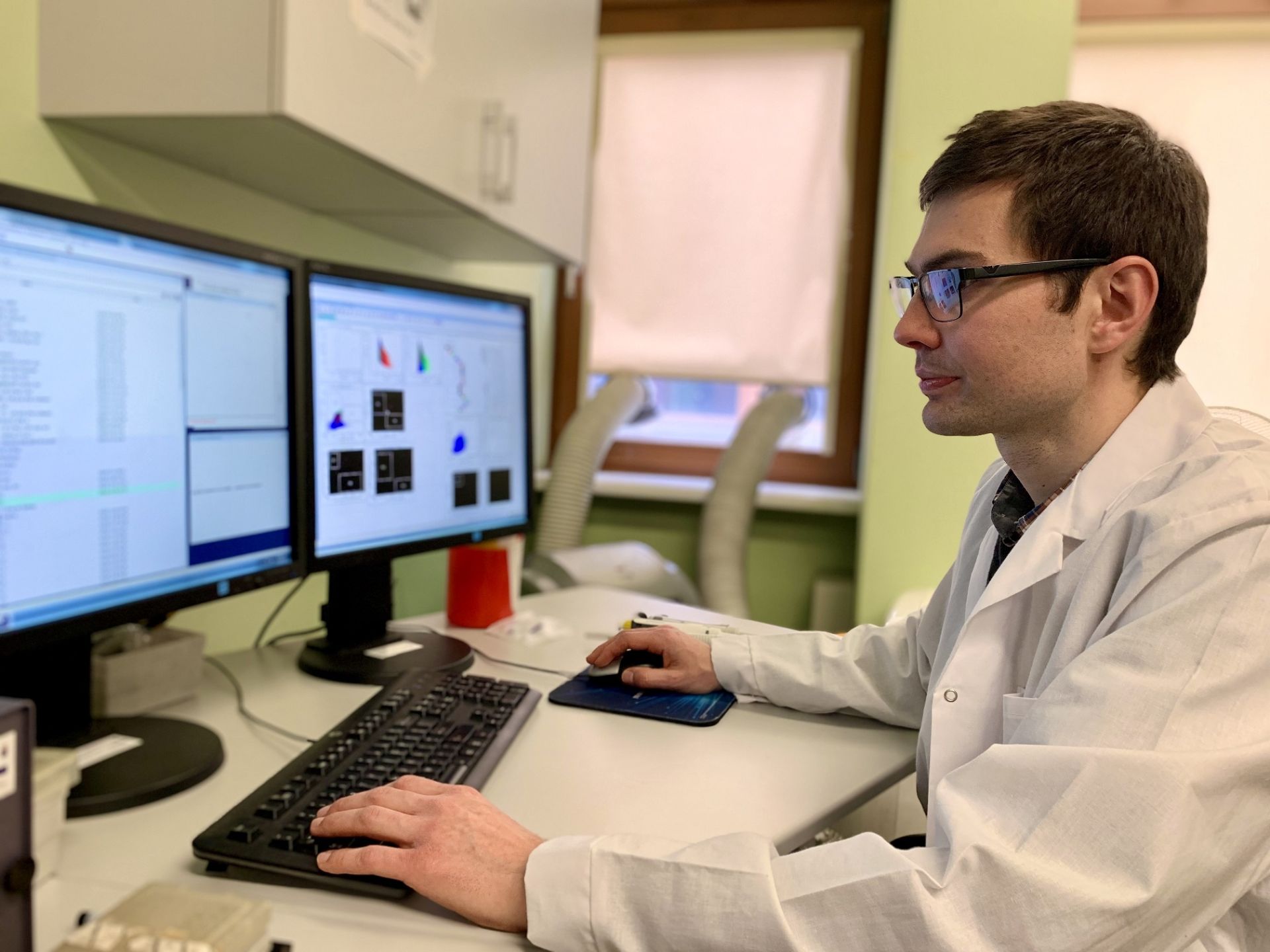 Dr Krzysztof Szade, photo from private archive
cells, and works at the Faculty of Biochemistry, Biophysics and Biotechnology at the Jagiellonian University. He returned to his home university after a postdoctoral fellowship at Stanford University. He is the laureate of three calls funded by NCN and FNP programmes. In 2022, he was awarded an ERC grant for a project entitled What does your blood remember? The memory of haematopoietic stem cells.
Dr Krzysztof Szade, photo from private archive
cells, and works at the Faculty of Biochemistry, Biophysics and Biotechnology at the Jagiellonian University. He returned to his home university after a postdoctoral fellowship at Stanford University. He is the laureate of three calls funded by NCN and FNP programmes. In 2022, he was awarded an ERC grant for a project entitled What does your blood remember? The memory of haematopoietic stem cells.
All blood cells, i.e. red and white blood cells and platelets, originate from haematopoietic stem cells. It is estimated that a million new blood cells are produced in the human body every second, and this process relies on haematopoietic stem cells throughout life. The mechanisms that regulate blood production must function with extreme precision – if too few cells are produced, anaemia may occur; if too many, serious consequences can also arise. In the short term, the body is able to increase the production of specific cells, but eventually it must restore balance and rebuild the whole system.
Krzysztof Szade and his team study how the haematopoietic system responds to various challenges and how it rebuilds itself after they subside. “If we start training intensively, for example, while preparing for the Tour de France, the body increases the production of red blood cells to improve oxygen capacity. If we have a chronic inflammation condition, we need more white blood cells for the body to effectively fight the infection. This entire process is tightly regulated, and we study how blood cells are formed and how their production is controlled at different stages of life,” he explains.
Stem cell memory
In his ERC project, the researcher studies haematopoietic stem cells, analysing their ability to remember past events and use this memory when responding to stimuli again.
The composition of our blood changes with age. If the body has repeatedly undergone bacterial infections, certain stem cell clones may “learn” to preferentially produce granulocytes. Others, in turn, may tend to increase the production of red blood cells. Over time, more and more stem cells develop such preferences. “We want to investigate whether stem cell memory and their ‘orientation’ toward producing specific cell types can be beneficial. And if so, whether it would be possible to control this memory. For example, could we programme the haematopoietic system to prepare it for the upcoming infectious season?” he asks.
The researcher emphasises that this is still just a hypothesis, but this is the direction in which his team’s research is heading.
Accumulation of mutations and cancer risk
Haematopoietic stem cells can also have their dark side. By being long-lived, they can accumulate mutations. “The average granulocyte lives in the body for 24 hours – within that time, it doesn’t accumulate enough mutations to become a cancerous cell. Haematopoietic stem cells stay with us throughout our entire life. We can ‘catch’ our first mutation at the age of five, the second at 20, the next at 45 – and suddenly it becomes dangerous,” he says. In the ongoing NCN project, he analyses how pre-leukemic stem cells contribute to the development of acute lymphoblastic and myeloid leukaemias. “These are cells that have already accumulated mutations but do not yet cause disease symptoms. However, another mutation could be the critical tipping point that triggers the cancerous process. The question we are looking to answer is whether we can detect such cells before they develop into full-blown cancer,” he says.
Stem cell microenvironment
In addition to the stem cells themselves, Dr Szade’s team also studies their microenvironment, known as the niche. Stem cells require very specific conditions in the bone marrow. Their function depends on surrounding cells and molecular signals. Scientists are trying to understand what conditions must be met for stem cells to function properly. “We are interested in whether something in this niche can be changed, whether some cells can be replaced with others to improve conditions for stem cells. We want to determine, for example, what endothelial cells produce that makes haematopoietic cells unable to function without them?” he says.
Understanding the mechanisms that regulate the haematopoietic system can help to better design therapies – both for cancer treatment and for immune enhancement. “These are long-term goals, but they are what drive our research,” emphasises Dr Szade.
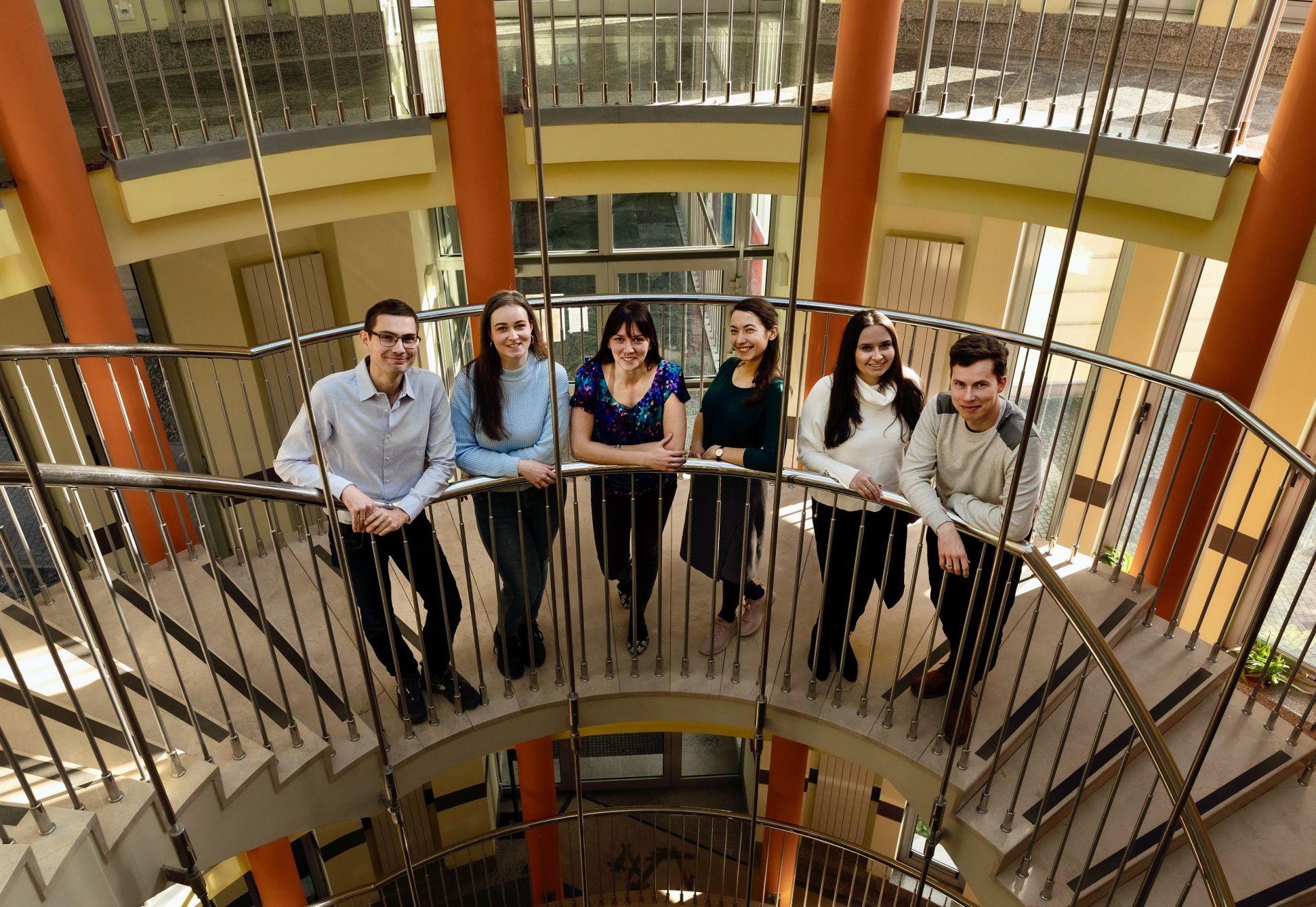 Dr Krzysztof Szade s team, photo from private archive
Dr Krzysztof Szade s team, photo from private archive
Return with a mission
Anna Korzekwa-Józefowicz: You said in an interview published in “Forum Akademickie” in January that you had consciously decided to return to your country and want to do everything possible to ensure that, in the long run, more people make the same choice. What influenced your decision to return?
Krzysztof Szade: Together with my wife, who is also working scientifically in a related field and who was also at Stanford, we had planned from the beginning to return to Poland to develop our research here. On the one hand, it was a matter of family considerations, on the other, it was a desire to transfer the knowledge we had gained and show that world-class science research can be conducted in Poland.
We wanted to see how science operates in the best research centres and then try to work in a similar way here.
We spent two years at Stanford. By American standards this was a relatively short stay, but it was crucial for our work. I was fortunate to be placed in an excellent laboratory and work under the guidance of an outstanding professor, Irving Weissman. He was the one who opened new perspectives in the field of haematopoietic stem cell research. As well as being an outstanding researcher, he is also a great person. Working with him contributed a lot to my growth and I still see the effects today.
What did you learn from him?
One such an example I remember: A paper in my field was published in Cell – one of the top journals in which one can publish in our field. We go to Irv and say: Irv, look, something doesn’t add up here, take a look at this figure. And he said: Leave it. This study will not change anything. Think about something else. And he gave us the following task: What if you created a system that allowed you to see how one cell connects to another, so that a marker would appear in that other cell? In this system, all the problems that are in this study would be solved much better.
Then Irv travelled for three months, but we already knew what we had to do. He gave us a clear direction to focus on. And it was from him that I learned how important it is to define the problem in science. What is truly the most important question in a given field? Because that is not always so obvious.
From him, I also adopted the mindset of constantly thinking about what could open up a new research direction, what has the greatest potential rather than just following what is currently being published in Cell, Nature or other prestigious journals, as that doesn’t always align with the trends that will be crucial in the future. It is important to have the ability to take on topics that are still poorly described.
Research in your field cannot be conducted without well-equipped laboratories. To what extent do the working conditions in Poland differ from those you had at Stanford?
In terms of technical aspects and infrastructure, access to high-quality research equipment is not a problem at the moment.
My field requires intensive work with laboratory animals. We work with stem cells, study rare cell populations, and need to analyse and sort them carefully. At the university, we have the animal facilities and the necessary infrastructure. Thanks to new grants, including from the ERC, I was able to develop this infrastructure. When researchers come from abroad, they often say: "You have everything you need here.”
Of course, some gaps still exist. A better microscope, the ability to use it on site – that would be useful, but it is not the most important thing.
What, then, are you missing?
In the States I saw what a culture of openness and constructive criticism looks like, which stimulates the search for new solutions. I remember my first meeting – after several months of work I finally had the findings, I was proud and presented them at the meeting. And then a colleague, now a professor at Stanford, stood up and said: "This is useless. Let’s correct this, this and this and then we’ll talk." No one took offence – everyone discussed, threw around ideas, joked. And it was working – the projects were really gaining momentum. In Poland, this is still lacking.
I would like to work in a place where there are constantly new people, new ideas, new grants, where there is an influx of fresh talent.
I understand that it is not at its best at the moment.
We need solutions that support the openness of universities. Today, the problem is the rigid structure – someone gets a position at the university and simply stays there for decades. Only a few units in Poland act differently, in a more open way – creating new positions, supporting the formation of new groups, sharing infrastructure.
Let us announce calls for researchers who have proven their activity and create the right conditions for them. Many researchers who have completed fellowships abroad could return to share their gained experience but often encounter the problem of a lack of positions. The system should support those who have gained knowledge at the best universities.
I got a full-time position myself as part of an ERC grant, I didn’t have one before. If I had not received this grant and my NCN-funded projects had ended, I would have had no further opportunities and would probably no longer be working in science.
There are EU funds for the development of top research units, but it is worth linking their funding to specific activities, such as the number of newly formed research groups. Continuity in education is important, but equally crucial is opening new scientific and educational fields. If a university is truly investing in development and opening up to new people, it should receive additional funds so that these groups can develop. Investing in the development of new research groups is simply worthwhile.
What else, besides greater openness of universities, should change?
One of the biggest problems in Poland is the wasting of resources. Sometimes I visit research institutions that are well-equipped – they have modern equipment, excellent infrastructure, but nothing is happening there. In the West, this is unthinkable – there, researchers fight for access to equipment, reserve slots for analysis on Sundays at 8:00 PM, and the equipment is in constant use. We lack that kind of efficiency in our country. Perhaps it would be worth implementing a system of reporting on equipment use – how much of the time it is actually in use and who is using it? If we invest in infrastructure, it cannot be left unused.
In Krakow, we are trying to change this – we are pushing for a model of joint interdepartmental units where equipment would be available to a larger number of researchers. We have apparatus that is used less frequently, so we should look for research groups that can use it effectively. If we have, for example, flow cytometers or a well-equipped animal facility, we should actively look for teams that can use them.
You are one of the people involved in efforts to increase the NCN budget, but when it comes to advocating for a larger budget for science in general, you seem more cautious. In the aforementioned interview, you stated that 3% of GDP for science is a good proposal, but that further increases in funding without structural changes will not yield the desired results.
It needs to be made clear – the amount of funding for science in Poland is the main limiting factor for any change. We are the sixth largest economy in Europe, yet in terms of the percentage of GDP allocated to science, we are at the bottom. That is absurd. Fortunately, voices are increasingly being heard that this needs to change. I fully support this – 3% of GDP for science is the goal we should aim for.
But simply pumping money into the system won’t be enough if it’s not followed by reforms.
There are ideas to give everyone more funds, but that is a road to nowhere. Effective science funding systems worldwide invest where there is quality and real achievement.
Funding should first and foremost support places where the highest quality research is carried out and where reliable scientific evaluation is applied, which is why the grant system is fundamental. We need transparent evaluation criteria and targeting of funds where the best results are achieved. Funding cannot rely solely on statutory funds, as this can lead to dispersion and reduced efficiency.
The researcher knows the findings best
In the recently announced programme for the development of Poland by Prime Minister Donald Tusk and Minister of Finance Andrzej Domański, science, including basic research, was recognised as one of the pillars. Thanks to, among other things, activities supporting the NCN, the discourse on science is changing – politicians emphasise that every zloty invested in research and innovation brings a multiple return to the economy.
Science has a value in itself.
In the case of basic research, it is impossible to predict which will lead to breakthrough implementations. An example could be the receptor targeted by Ozempic – when it was studied years ago, no one could have predicted that it would become a therapeutic target for a medication that today drives Denmark’s economic growth through the company Novo Nordisk. These kinds of discoveries cannot be planned in advance.
Implementation research does not give me the greatest satisfaction because, in addition to the scientific work, it also requires finding business partners and developing commercialisation strategies. But, as Professor Weissman said, no one knows the findings of their research better than the researcher themselves, so it is our responsibility to recognise their potential applications. We should constantly analyse our findings and consider whether they could have practical significance and, if so, attempt to implement them.
We ourselves are increasingly collaborating with clinicians from the Medical University of Lodz and the Jagiellonian University’s Collegium Medicum to translate our knowledge into practice. Especially in the context of leukaemia research, we now have several promising projects.
What does this research involve?
We focus on the mechanisms of clonal evolution of cancer, specifically how mutations accumulate in stem cells, leading to leukaemia. It is often referred to as the “final blow” – the mutation that directly causes the disease. Chemotherapy can effectively eliminate leukemic cells, but it does not always remove pre-leukemic cells that have already accumulated mutations. If one of them acquires a new mutation, the process starts again, often in a more resistant form.
To effectively treat leukaemia, we need to understand these development pathways from the very beginning – from the stem cells. Research at the single-cell level is crucial because we cannot analyse them in bulk by throwing them into a single sample. It is difficult and expensive, but it gives precise information about which cells are likely to become cancerous and where to target in order to stop the disease at its source.
We analyse bone marrow samples from leukaemia patients to find rare stem cells that are not examined for in standard diagnostics. In the case of children with lymphoblastic leukaemia, up to 80 per cent of the bone marrow may consist of cancerous cells, but among them, we try to find and analyse the stem cells – assessing whether they are healthy or already burdened with mutations. This is important because these are the cells that the body will need after treatment and recovery.
Our goal is to determine whether analysing these early stages of cancer development can help improve leukaemia treatment in the future.
One of the demands raised by researchers – in addition to increasing funding for quality science – is a change in the public procurement law.
Public procurement law torpedoes science in Poland. I understand its purpose, but it does not work at all in research. Instead of doing research, we are writing more proposals and justifications to transfer funds to where they are most needed. It’s a bit like that joke about the hare who comes to the petrol station and asks:
– How much does a drop of petrol cost?
– A drop? It costs nothing.
– So please fill up the whole tank for me.
And it’s the same with us – each individual procedure seems like a small detail, but when we sum up hundreds of them, all the time we could be dedicating to research literally “drips” away into bureaucratic forms.
My general impression is that we have ideas in Poland that are by no means worse than those abroad, but their implementation here is much more difficult. First, it is the huge bureaucracy and regulations that tie the hands of researchers. Second, we lack adequate technical support. We have great equipment, but we don’t invest in people who could fully use it. We need specialists who don’t have to apply for grants or write publications but simply know how to operate the equipment as efficiently as possible. This is sorely lacking, and without it our laboratories do not operate as efficiently as they could.
A mature idea for the ERC
You talk about valuable ideas from Polish researchers. This is not reflected in the statistics of the European Research Council – out of about 17,000 grants awarded by the agency, fewer than 100 have been or are being implemented in Poland. What actions could be taken to increasing this number?
There are a lot of people who are very good, publish at a high level and apply for these grants, but you know that the call is huge, and you don’t always manage to receive funding. It is worth remembering that success depends not only on the quality of the project, but also on random factors, such as the composition of the panel or reviewers. The average success rate in the ERC grants is 10-15%, which means that even excellent researchers may not receive funding. That’s why it’s crucial to make attempts – the more proposals, the greater the chances of success.
For me, the greatest value of the ERC is the quality and number of reviews, as well as the fact that the proposals are evaluated by the best experts. That makes this grant truly a distinction – going through this evaluation process means a lot.
One of my previous interviewees, Prof. Róża Szweda, emphasised that recognition is very important in applying for an ERC grant. It is not only a question of a well-developed proposal, but also of building your position in the community
Recognition certainly helps. If we actively participate in conferences, discuss with experts, present our work to them, this can of course help – especially as it is these people who can then evaluate our proposals. However, this is not decisive. Our previous publications and achievements show who we are as researchers.
I think being open to criticism is key – the idea for a project should be discussed and reviewed as early as possible. My idea for the ERC grant came while I was still at the end of my PhD, before I went to the United States. There I was dealing with something completely different, but the topic was still on my mind, and I consulted many people, including researchers outside my narrow specialisation, looking at it from different perspectives. Finally, someone suggested to me: "You’ve got to try it", and I did – but only because the idea was by then mature, well thought out and subjected to previous criticism.
Consultation with people outside the narrow field is very important. They too should understand the essence of the project, identify the gap in the knowledge it is trying to fill, and see what the proposed solution can contribute to.
When it comes to the proposal itself, I always say that the first page is the most important. On this page, the research problem, the approach to solving it, and the potential outcomes must be clearly defined. It is important that the description indicates how the project breaks the status quo.
In the States, when I was writing proposals to National Institutes of Health, I was taught that so-called specific aims – precisely formulated research objectives – were key. If they are well developed, the entire proposal can then be refined efficiently, because it is clear that the researcher already has a well-defined concept and knows what he or she wants to achieve.
Previous experience in national calls – NCN and FNP – had an impact on your result in the ERC call?
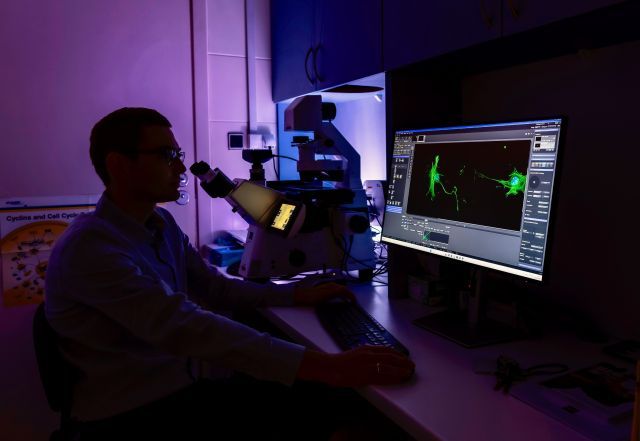 Dr Krzysztof Szade's team, photo from private archive
Dr Krzysztof Szade's team, photo from private archive
Definitely yes. I write proposals to the NCN and ERC in a similar way, although of course a project submitted to the ERC has to go beyond the standard approach. I try to take on risky challenges rather than limiting myself to topics whose implementation is entirely predictable.
Science is not a business plan. Sometimes we spend a year researching a topic, invest a lot of money, everything seems promising and then it turns out that nothing comes out of it, and we are none the wiser than we were at the beginning.
Every ambitious scientific work involves risk. In science, we often talk about the principle of “high risk, high gain,” but it could just as easily be “high risk, high fall.” Sometimes a project that seemed like a great idea turns out to be impossible to carry out due to unforeseen factors that complicate everything.
It doesn’t always work out, but it is crucial to look for new solutions instead of following the well-trodden paths.
You mentioned that your wife was also at Stanford. Dr Agata Szade is a very active researcher, working in a related field and her study has been frequently recognised by Polish and international bodies.
Yes, and it’s of great importance to me – I’m happy that we can both grow academically. This, however, requires many compromises. We often have to choose: one conference here, another there – and someone has to stay with the children. A scientist’s work doesn’t end at 5:00 PM, so balancing it with family life can be a challenge. It’s not easy, but it is possible. That’s why programmes supporting researchers in balancing their careers with parenthood are so important. NCN implements this well, for example by allowing an extension of the application period for grants to account for maternity duties. Without this, it would be much more difficult.
NCN’s interview series on research, career paths and balancing professional and private roles previously featured among others, ERC grant laureates, including Prof. Anna Matysiak, demographer and economist, Prof. Róża Szweda, polymer chemist and Prof. Ewa Szczurek, computer scientist, and the fellows of the L’Oréal-UNESCO programme for Women and Science – Dr Zuzanna Świrad and Dr Marta Pacia and Dr Aleksandra Rutkowska.
In the latest episode of the NCN podcast we talked about research and proposal evaluation in ERC calls with art historian, Prof. Grażyna Jurkowlaniec and neurobiologist, Prof. Ewelina Knapska.
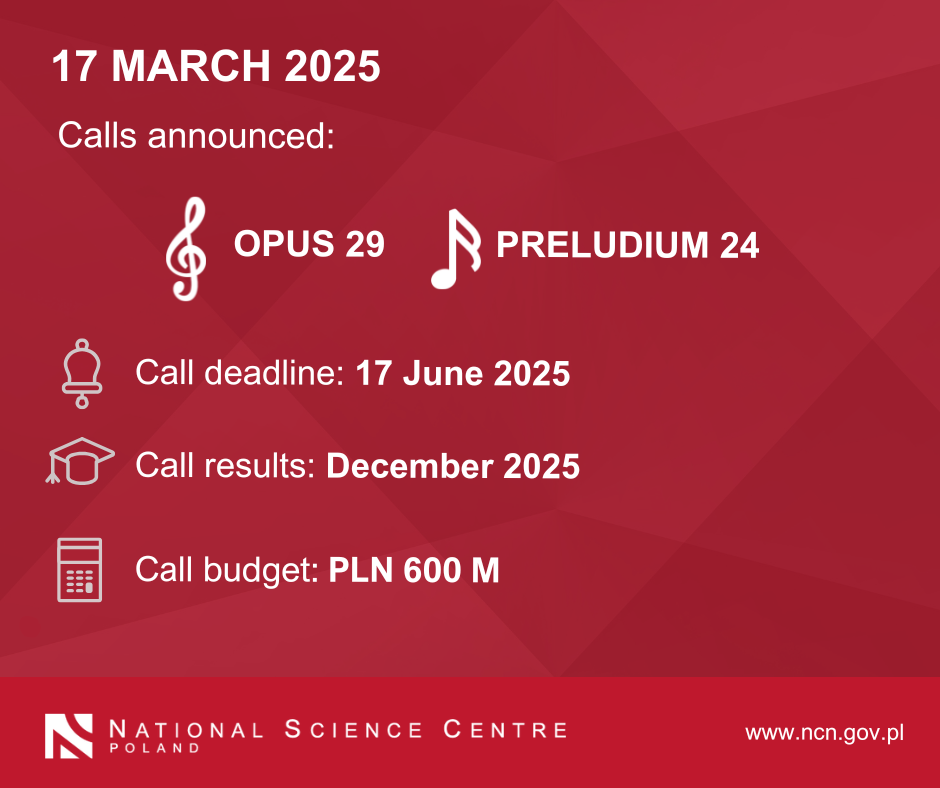 ant holders will be able to pursue their projects in any research institute in Poland. Any topic may be chosen from 26 review panels, however only basic research proposals are allowed (empirical or theoretical endeavours undertaken to gain new knowledge of the foundations of phenomena and observable facts, without any direct commercial use).
ant holders will be able to pursue their projects in any research institute in Poland. Any topic may be chosen from 26 review panels, however only basic research proposals are allowed (empirical or theoretical endeavours undertaken to gain new knowledge of the foundations of phenomena and observable facts, without any direct commercial use). 



